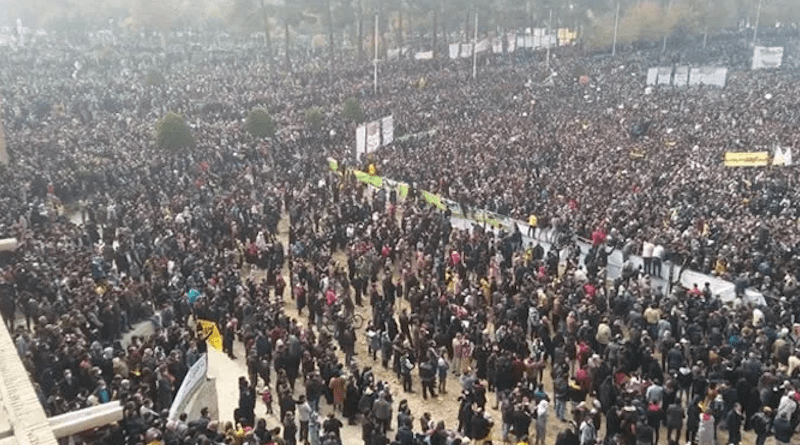Iran Is Staggering Under Inflation, Poverty, Revolts And Repression – OpEd
By Hamid Enayat
On May 16, the India-based newspaper Etemaad Daily reported that 72 million people in Iran needed subsidies. This means 80% of Iran’s population is on the brink of survival.
This dire reality is the reason there is unending insurgency in Iran: Inflation is over 40%, and since it raises prices of all basic needs, it directly and adversely impacts people’s lives.
The current situation is also very different—and dangerously worse than the 2019 spikes in fuel prices that sparked widespread uprisings. Iran’s regime struggled to keep control of the nation during the 2019 uprisings and only quieted the streets by attacking and murdering 1,500 protesters.
In recent years, the Iranian regime still had currency reserves to pay its own militias in the region, such as Hezbollah in Lebanon, and fund its aggressive acts, such as Iran-backed Houthis in Yemen conducting drone attacks on oil tankers from other countries. But those reserves have apparently bottomed out and selling cheap oil to China is not bringing in enough funds.
So the regime is taking bread and other vital products off the people’s tables, and the Iranian people are already rising up in protest.
Iran’s domestic upheavals are exactly what the regime fears most. On January 25, 2016, Iranian Supreme Leader Ali Khamenei stated that if Iran does not keep the fight outside its borders, “we must fight the enemy here in Kermanshah and Hamedan and other provinces.”
Khamenei’s statement is very true. A regressive regime based on medieval religious dogmas cannot meet the modern economic, cultural and political demands of Iran‘s people, so it must rule them with brutality—and in secrecy. The reason there has not been a moment of peace in the 40 years of this regime is because war and crisis has served as a cover for the regime’s inhumane internal repression.
Today’s situation for the regime is so critical that Haddad Adel, the former speaker of parliament who is very close to Khamenei, said on May 23, 2022, that “everything is in disarray.” What he is saying is that chaos is now prevailing in Iran.
Qassem Saedi, a member of Iran’s parliament, has warned that “it is possible that more dangerous events than the uprisings of 2018 and mid-November 2019 will occur.” Mullah Shahrokhi, imam of the Friday prayer in Lorestan, has echoed this, saying on May 13 that the regime’s domestic opponents “will repeat the adventures of mid-November 2019 and 2009 in the streets.” A few days later, the daily publication Jahan-é-Sanat said that “in the capital, too, there is an unusual atmosphere and signs of protest.”
Indeed, it seems that mass anger is uncontrollable: When the regime sent its counter-insurgency forces to Khuzestan, there were demonstrations and unrest in Khorasan the next day. When the forces went to Khorasan, the flames of an uprising in Sistan and Baluchestan were ignited. As the regime tried to control these revolts, they spread to Lorestan, Chaharmahal and Bakhtiari.
These riots are not just about bread. They are political protests because Iran’s people want to take their destiny into their own hands. The Supreme Leader of Iran controls everything. He even acted to get Iranian President Ebrahim Raisi elected—despite Raisi’s heavy responsibility for the massacres of 30,000 political prisoners in 1988 and the deep crisis of legitimacy his election would entail.
According to Maryam Rajavi, leader of the Iranian opposition, the regime’s use of assassination and the military rule will not prevail.
Raisi was elevated to the presidency to block the uprisings, even though he is a person who, according to Amnesty International and the United Nations, has a black record with the 1988 massacres. After a year, we can say with certainty that Khamenei’s hopes for Raisi-enforced domestic stability have not been realized.
That is why the Supreme Leader, and his regime are stepping up their efforts to destroy the only democratic alternative (the National Council of Resistance of Iran) through terrorism and demonization.

